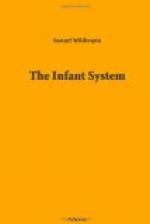In the case of the child not thus befriended, we see it, either exposed to the dangerous associations of the street, or to the bad examples of its parents; to their unkindness and severity, or misguided indulgence; and presented, moreover, with every facility, as well as every temptation, to do wrong. Now, is it to be wondered at, that, in the former case, kind, obedient, honest characters should be the result; and in the latter, such as we have, in our preceding examples, exhibited? Reason tells us such a consequence is likely, and experience has shewn us that it really happens. I could enumerate a thousand cases of honest principle in the infants who have been under my own care; but I can only mention one or two circumstances illustrative of the matter.
I once had, for example, two little boys to travel with me; their assistance was extremely valuable in organizing schools. They were often invited to accompany me at dinner; the guests generally gave them presents. I have watched them under many tempting circumstances, and never found them steal. It is my firm conviction that dishonesty is chiefly the effect of neglect. No child can be born a thief, in the strict sense of the term. In many schools, too, there are fruit-trees planted in the play-ground, to which the children will not do the least injury, nor will they touch the fruit. Flowers in pots, such as geraniums, auriculas, and other plants, are placed in the middle of the play-ground, without the least danger of being injured. Such is their respect to private property.
Another instance particularly excited my notice amongst the children in the first establishments in London. They were permitted to bring their dinners with them, and there were boxes in the school to put them in. Every child in the school had access to these boxes, for they were never locked, and yet I never knew a child to lose his dinner, or any part of it, notwithstanding many of the children, to my knowledge, had been kept extremely short of food. I have known an instance of a slice of bread and butter being left in the box for several weeks, by some child that could not eat it, but none of the other children would dare to touch it. I have found in the boxes two or three pieces of bread, as hard as possible, and as a proof that many were hungry, and that it did not remain there because they could not eat it, but out of pure honesty, I have offered it to some of the children, and they have eaten it in that state. Cold potatoes, pieces of fat, &c., were not unacceptable to them when given; but sooner than take any thing without leave, they have actually left it to spoil. These are facts which shew, that notwithstanding all the disadvantages to which the poor children are exposed, their character may be so far formed as to produce the effects above described. “Would you take a piece of bread out of this box that did not belong to you?” said I to the children one day. “No, sir,”




